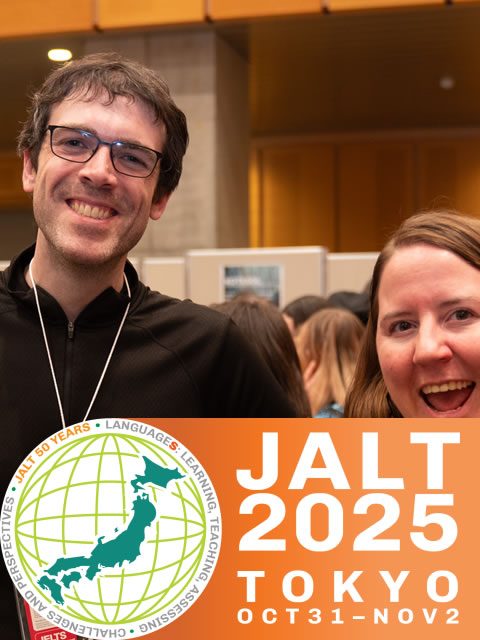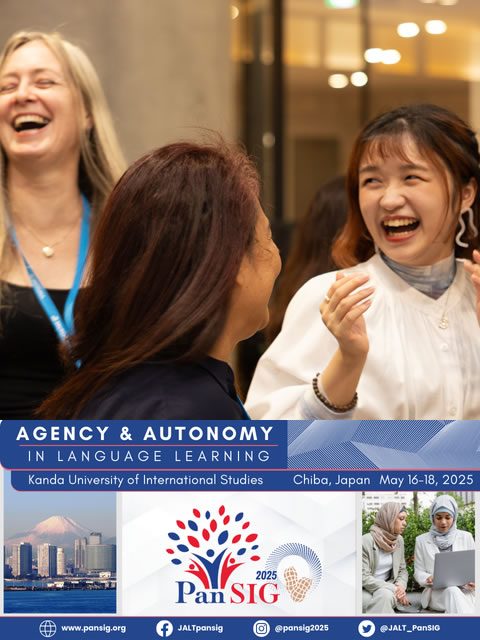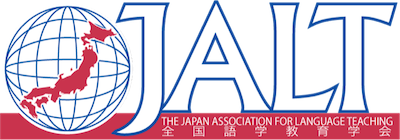Your cart is currently empty!
JALT2017 Featured Speakers
•
David Beglar
Steve Mann
Paul Nation
Patrick Newell
Sumiko Ogawa
Rab Paterson
Christine Pearson Casanave
Shoko Sasayama
Malu Sciamarelli
Reiko Yoshihara
David Beglar
Temple University, Japan Campus
Sponsored by Temple University, Japan Campus
Teaching Speaking: The Key is Scaffolding
Sunday Nov 19, 5:05 PM – 6:05 PM
Empirical research in the fields of SLA and educational psychology provides ideas for ways in which teachers can scaffold learners into speaking more skillfully; however, many of these ideas are not implemented or are implemented only partially in many EFL classrooms. The purpose of this presentation is to present an empirically supported model for teaching speaking that can be applied to learners at all proficiency levels.
Additional Presentation: Developing Reading Fluency via Extensive Reading
Saturday Nov 18, 4:20 PM – 5:20 PM
Empirical research indicates that extensive reading (ER) can help second-language learners develop greater reading fluency; however, this same research, particularly when combined with theories of fluency development, suggest that some types of extensive reading should be more effective than others. The purpose of this presentation is to describe approaches to ER that should be most effective in developing reading fluency and the reasons why those approaches should work effectively.
David Beglar is the Academic Coordinator for the M.S.Ed. and Ph.D. programs at Temple University, Japan Campus. He has published academic articles in Language Learning, Language Testing, Reading in a Foreign Language, Language Teaching Research, JALT Journal, and The Language Teacher. He has also recently co-authored the fourth edition of an academic listening textbook, Contemporary Topics 3 (Pearson). His research interests include foreign language assessment, vocabulary acquisition, and reading fluency development.
Temple University, Japan Campus: https://www.tuj.ac.jp/
Steve Mann
University of Warwick
Sponsored by Abax
Reflective Tools for Teacher Development
Saturday Nov 18, 12:40 PM – 2:10 PM
This is intended as an evidence-based look at how reflective practice ‘gets done’ featuring accounts from teachers about which tools have been most helpful. The workshop will begin with elicitations of teacher experiences using (or not using) reflection, and give some background on RP. The second part will concentrate on spoken, collaborative and dialogic reflection, and on Cooperative Development. The workshop will feature a range of reflective tools such as stimulated recall and on-line options.
Additional Presentation: Ways in Using and Augmenting Material
Sunday Nov 19, 9:15 AM – 10:15 AM
This talk examines how teachers can go about using core course materials, how they can choose what to focus on, and how to expand on, supplement and teach outside these materials. The talk also includes a focus on digital video, including an overview of research projects into video use, and introduces various video-based pedagogic practices such as the use of video in feedback and use of screen-capture software for the flipped classroom.
Steve Mann is Associate Professor at the Centre for Applied Linguistics, University of Warwick. He has long been active in teacher training schemes, focusing particularly on the impact of early teacher training schemes in shaping the classroom, investigations of teacher education and development in different national situations, and a global examination of NEST and NNEST collaborative practices. He is also very much interested in blended learning, and the use of technology in teacher development.
Facebook: http://www2.warwick.ac.uk/fac/soc/al/people/mann/
Paul Nation
Victoria University of Wellington
Sponsored by Compass Publishing
Simplified Material in Language Learning
Saturday Nov 18, 4:20 PM – 5:20 PM
Simplified texts are commonly used in teaching English as a foreign language but many researchers and teachers are concerned about the validity of using such texts, seeing unsimplified texts as being more authentic. We’ll examine the reasons for simplifying texts and effects of simplification on the occurrence of vocabulary in the texts. It looks at the advantages and disadvantages of simplification and examines the nature of validity as it applies to learners interacting with texts.
Additional Presentation: How Important are Fluency Development Activities?
Sunday Nov 19, 2:10 PM – 3:10 PM
This paper describes the kinds of activities that can be used to develop fluency. It focuses on the size of the change that such activities can bring about, as indicated by research. Using this information I attempt to quantify how much time should be spent on fluency activities in an English course.
Paul Nation is Emeritus Professor of Applied Linguistics in the School of Linguistics and Applied Language Studies at Victoria University of Wellington, New Zealand. He has published widely on vocabulary learning, as well as reading and vocabulary oriented textbooks. He provides many free books and resources for teachers at his website: http://www.victoria.ac.nz/lals/staff/paul-nation.aspx, and What should every ESL Teacher Know is available free on the Compass Publishing website.
Victoria University of Wellington: http://www.victoria.ac.nz/lals/staff/paul-nation.aspx
Personal Website: Paul.Nation@victoria.ac.nz
Patrick Newell
TEDx Tokyo and Tokyo International School
Sponsored by National Geographic Learning
Power of TED
Saturday Nov 18, 10:55 AM – 12:25 PM
TED is a powerful language learning tool by defining a good idea, storytelling and guiding learners through their curiosity and passion. Spreading ideas is important and our ability to share ideas in whatever language is as important as the idea we want to share. This workshop will examine the process used with hundreds of TEDx speakers (many of them second language learners) to better understand how to deliver content to the learners you serve.
Additional Presentation: Future of Learning
Sunday Nov 19, 9:15 AM – 10:15 AM
Language learning will shift exponentially in the new age of artificial intelligence, virtual reality, augmented reality, and 3D printing aligned with the human side. We will explore how 1+1=11. A key factor for wiring our brain for change will be the synergy of human language + technology (AI) to = 11 or Creative Collective Intelligence. Find out how multilingualism will become the norm utilizing AI offering 24/7 one to one education.
Patrick Newell is an educator, catalyst and leader who focuses on aligning people and organizations with their potential and future. As a learning activist for the past twenty years, He focuses on developing collaborative models in technology, learning, board governance, accreditation, and entrepreneurial mindedness. He co-founded Tokyo International School, whose students are encouraged to be globally-minded leaders, and the NPO 21 Foundation (http://www.21foundation.com), which raises awareness of the need for future-oriented education.
Facebook: https://www.facebook.com/patrick.newell
Sumiko Ogawa
Meio University
Sponsored by the Global Issues in Language Education (GILE) SIG
Inspiring Japanese Students to be Global Citizens
Sunday Nov 19, 12:25 PM – 1:25 PM
This featured speaker workshop will provide language teachers with ideas to help them better prepare Japanese students to survive and prosper in our global age. It will outline core competencies of global education that allow learners to actively engage with the world, and develop skills and values that will enable success in the future. The session will describe the presenter’s personal journey to global awareness and have participants consider their own paths to world citizenship.
Sumiko Ogawa teaches Public Health and Global Health in Okinawa, as Professor in Meio University’s Faculty of Health Sciences. She has a PhD in Human Sciences from the Graduate School of Osaka University, and Master’s degrees in both Public Health (Antwerp, Belgium) and Medical Science (Osaka). Her special interests, other than these specialties, include how to globalize Japan’s younger generation through innovative education and experiences. She also has two children studying in AMICUS International School.
Personal Website: http://sumikoogawa.wix.com/website
Rab Paterson
Toyo University
Sponsored by the JALTCALL SIG
Research around the World – Shaping the Classroom!
Sunday Nov 19, 5:40 PM – 6:40 PM
Recent research in cognitive learning, ergonomics and kinesiology is impacting forward thinking schools in how they design the layouts of their classrooms. This session will show some innovative classrooms shaped according to real world research on how learning takes place. So in this session we will explore how teachers can reconfigure their classroom shapes to make them more suitable for 21st century learning with the next generation of students.
Additional Presentation: Are You Changing With The Times?
Saturday Nov 18, 12:05 PM – 1:05 PM
This session surveys the issues driving creative and innovative classroom change globally. It will examine cases where this has been successful, and some that were not, and these successes and failures will be explored with the attendees. It the room allows some of these approaches may be modelled during the session. So attendees should leave with a heightened awareness of the issues involved and be ready for the follow on 60 minute Featured Speaker Workshop.
Rab Paterson is Principal Instructor in the Toyo University Business English Program, Director/Webmaster of the Asia Association for Global Studies, Fellow of the British Royal Asiatic Society, and member of many other ed-tech/teaching associations. He has a BA, MA, COETAIL and MS qualifications and is currently a doctoral candidate at University College London’s Institute of Education. Rab is also an Apple Distinguished Educator, a Google Innovator, Trainer, GEG Leader, and Educator.
Toyo University: http://www.toyo.ac.jp/site/bec/
Twitter: @rabpaterson
LinkedIn: http://www.linkedin.com/in/rabpaterson
YouTube: http://www.youtube.com/user/rabpaterson
Google+: google.com/+RabPaterson
Christine Pearson Casanave
Temple University, Japan and Middlebury Institute of International Studies at Monterey
Sponsored by Tokyo JALT and the College and University Educators (CUE) SIG
Writing for Publication: Challenges and Strategies
Saturday Nov 18, 10:55 AM – 11:55 AM
In this workshop, the presenter blends lecture, discussion, and tasks to review purposes, challenges, and strategies in writing for publication for language teachers. She highlights different types of publications from research articles to textbook writing, and discusses what manuscript reviewers do and what strategies authors can use to write and revise. Tasks include topic selection; selecting journals and publishers according to author submissions guidelines; identifying features of different possible writing styles; and time management ideas.
Additional Presentation: Issues for Teachers in Writing and Publishing
Sunday Nov 19, 6:15 PM – 7:15 PM
In this talk the speaker discusses why language teachers benefit from writing for publication. Points include why writing for publication is important whether personally or institutionally motivated, and why “publishing” on social media is insufficient. She also describes different types of publications and different venues (local, international, print, online, article, book, conference proceedings, chapters, predatory journals), presents some strategies for busy teachers, and discusses several caveats, including the difficulties of topic selection and time management.
Christine Pearson Casanave taught for 12 years at Keio University (SFC), and also in the MATESOL program at Teachers College Columbia University in Tokyo, and then later in the MA and doctoral programs at Temple University in Japan. Now, from her home base in California, she advises Temple doctoral students on their qualitative dissertation projects. She also publishes and presents on topics in second language writing, thesis and dissertation writing, and writing for publication.
Temple University, Japan: https://www.tuj.ac.jp/tesol/
Middlebury Institute of International Studies at Monterey: http://www.miis.edu/academics/programs/gstile
Shoko Sasayama
University of Tokyo
Sponsored by Atama-ii Books
An Evidence-Based Approach to L2 Task Design
Sunday Nov 19, 12:25 PM – 1:55 PM
This workshop will survey findings of L2 task complexity research and serve as a platform to start thinking systematically about designs of L2 communication tasks. The accumulated research on task complexity allows us to take an evidence-based approach to designing tasks in ways that should maximize L2 learning. Based on the research findings, participants will explore how to design tasks for distinct learning purposes, in both face-to-face and technology-mediated teaching environments.
Additional Presentation: What can L2 Learners Tell Us About Task Design?
Saturday Nov 18, 5:30 PM – 6:30 PM
This paper reports on an investigation of the relationships among task design, cognitive demands, and task performance, focusing on learners’ perspectives. Various factors, including task design, individual differences (e.g., learners’ task interpretation, motivation), and language-related factors, were perceived to contribute to cognitive task complexity, although each to varying degrees depending on learner characteristics. Interestingly, these factors exhibited both positive and negative impact on learner language performance. Suggestions are made for critical factors in task design.
Shoko Sasayama is a Project Assistant Professor in the Center for Global Communication Strategies, University of Tokyo. After studying at the University of Hawaiʻi at Mānoa as a Fulbright scholar, she joined the Ph.D. program at Georgetown University where she completed her Ph.D. in Linguistics. Her academic interests include: SLA, Language Education, and Educational Assessment. She has focused her research and work on facilitating improvement of language education in Japan and the US.
University of Tokyo: http://ale.c.u-tokyo.ac.jp/ale_web/index.php/shoko-sasayama
Malu Sciamarelli
The C-Group
Sponsored by Pilgrims English Language Courses, the Literature in Language Teaching (LiLT) SIG, and the Teaching Young Learners (TYL) SIG
Creative Writing, Essential, not Supplemental
Sunday Nov 19, 1:35 PM – 2:35 PM
Many teachers feel there is no time for poetry, stories, or creative activities alongside all the other language goals of their lessons. This workshop will explore the essential benefits of using creative writing in the language classroom and what it can teach us about creativity in general. Participants will leave with ideas for developing activities as an integral part of the syllabus, allowing students to experiment with language, and making learning more engaging and memorable.
Additional Presentation: Literature for All: Creative Texts for Every Class
Saturday Nov 18, 1:15 PM – 2:15 PM
Teaching language through literature makes learning and teaching more interesting for students, from all levels and ages, as well as for teachers. In this session, I will show how the use of extracts from classic to modern literature enhances students’ creative writing, develops their imagination, and increases motivation. In addition, I will show that how bringing literary texts enhances students’ creative writing skills, improves critical reading ability, and sharpens critical thinking skills.
Malu Sciamarelli has been an active member of the ELT community for 23 years, working as a teacher and freelance teacher trainer in private schools and language institutes in Sao Paulo State and Rio de Janeiro State, and publishing and presenting. While developing her skills as a teacher and trainer, she has also been an active member of the C-Group (http://www.thecreativitygroup.weebly.com), dedicated to increasing the creativity found in language classrooms throughout the world.
Personal Website: www.malusciamarelli.weebly.com
Twitter: @malusciamarell
Facebook: https://www.facebook.com/malu.sciamarelli
The C-Group: www.thecreativitygroup.weebly.com
Reiko Yoshihara
Nihon University
Sponsored by the Gender Awareness in Language Education (GALE) SIG
Feminist Approaches in University EFL Classes
Saturday Nov 18, 5:30 PM – 6:30 PM
What is feminist teaching in TESOL? How do you teach feminist thinking in your EFL classes? Feminist teaching can take many forms and different approaches. The first part will be a guided discussion of feminist teaching. We share our feminist teaching experiences and practices. The second half of the workshop will show several ways of feminist teaching from my research data. Through this workshop, participants will understand a variety of feminist teaching forms and approaches.
Additional Presentation: Narratives of Feminist EFL Teachers’ Identities
Sunday Nov 19, 4:30 PM – 5:30 PM
Through feminist EFL university teachers’ narratives, I explore the complex relationships between their feminist identities and classroom practices. This presentation will show what feminist identity the teachers have, how they develop feminist identities, and how their feminist identities reflect their classroom practices. Findings suggest that their feminist identities influenced their classroom practices in several ways. However, their feminist identities were not always reflected in their classroom practices because of multiple identities and contexts.
Reiko Yoshihara is an associate professor in Nihon University. She has an M.S. in Women’s Studies (Minnesota State University, Mankato), and an M.Ed. and an Ed.D. in TESOL (Temple University, Japan). Her research interests include feminist pedagogy in TESOL, teaching about gender issues in EFL contexts, and teacher identity. She has currently published The Socially Responsible Feminist EFL Classroom: A Japanese Perspective on Identities, Beliefs, and Practices (Multilingual Matters, 2017).
Nihon University: http://www.bus.nihon-u.ac.jp/commercial/facultymember/detail_20090700037…
Facebook: https://www.facebook.com/reiko.yoshihara.77

JALT2025 International Conference
2025年10月31日(金)〜2025年11月02日(日) 東京都渋谷 国立オリンピック記念青少年総合センター Friday, October 31 – Sunday, November 02, 2025 • National Olympics Youth Memorial Center, Tokyo, Japan

PanSIG Conference
PanSIG 2025 will be held May 16-18 in Chiba. PanSIG is an annual conference organized by JALT’s Special Interest Groups (SIGs).
